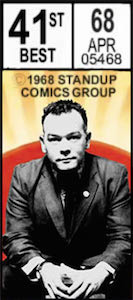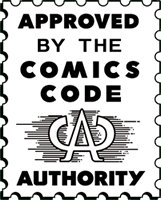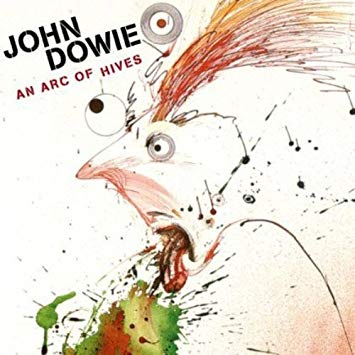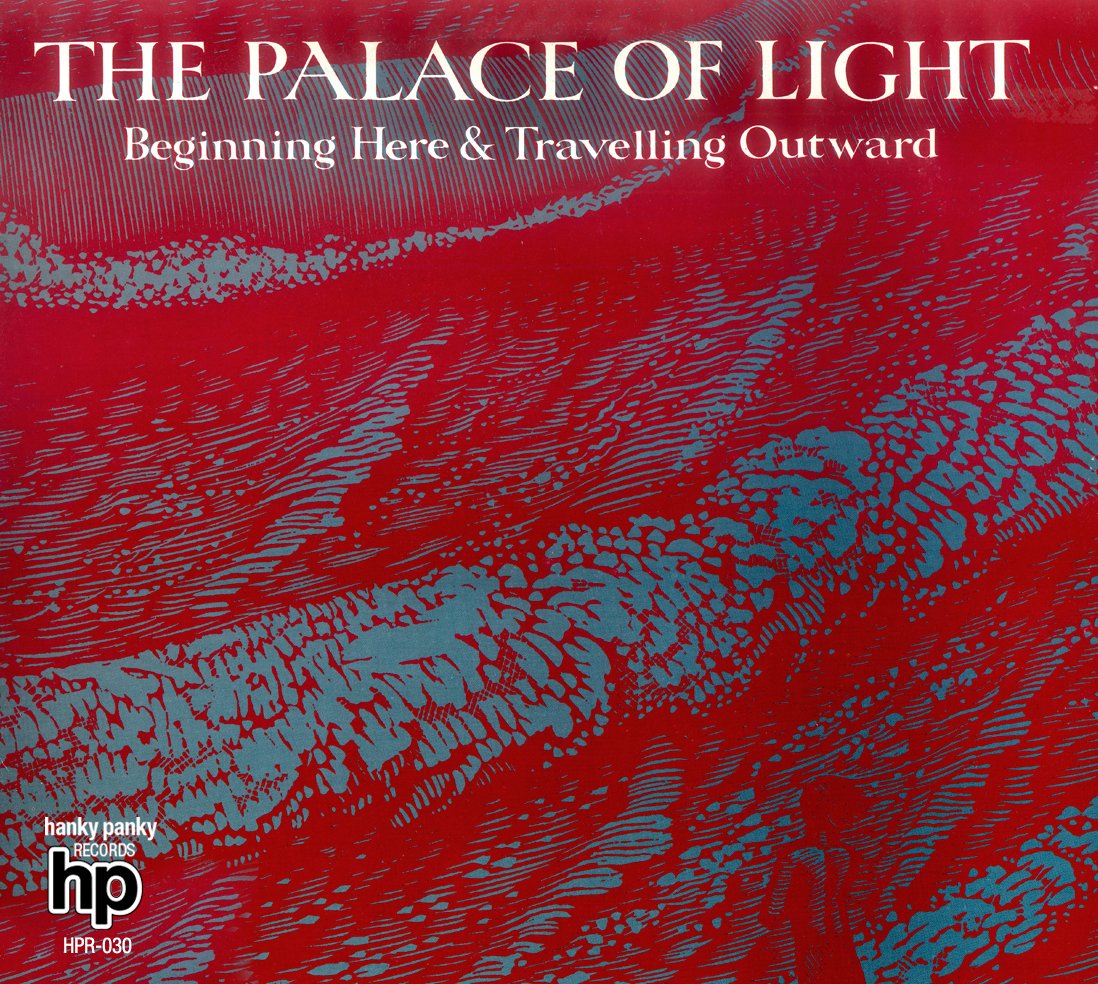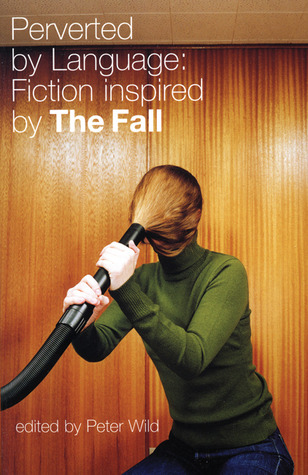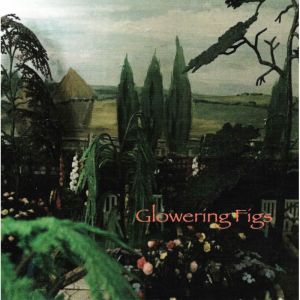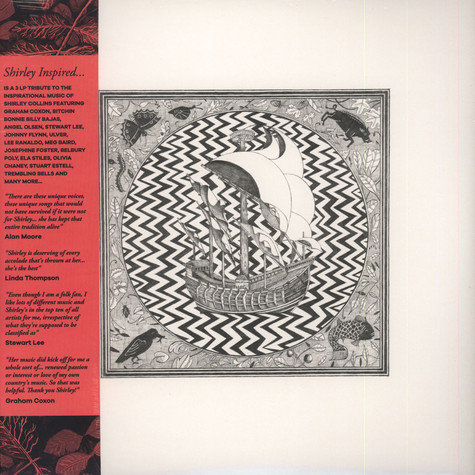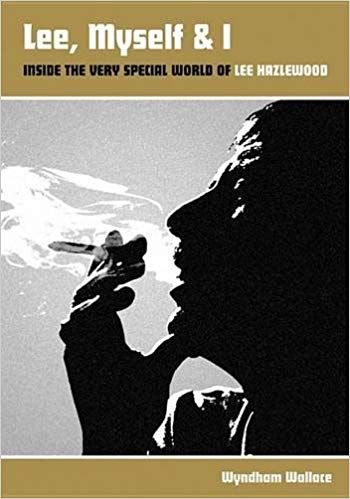Contributions - Billy Childish – Punk Rock Ist Nicht Tot
Punk Rock Ist Nicht Tot is a career-spanning compilation album by hugely prolific Godfather of the Kent punk and garage rock scene, Billy Childish. Contains songs from his work with The Pop Rivets, The Milkshakes, Thee Mighty Caesars, The Delmonas, Thee Headcoates and more. Sleeve notes by Stewart Lee.
More Info on the release here.
Here’s a field guide to the many faces of Billy Childish. by Stewart Lee
From 1977 to 1980 The Pop Rivets played contemporary sounding primitive punk, Childish alongside Bruce Brand on guitar, and then on drums, who was to stay at his side until the end of the century; from 1980 to 1984 The Milkshakes mined the sound of exactly Hamburg 1961. The later, stomping garage anthem ‘I’m Out Of Control’ (included here), could have been written by the Sonics, The Wailers or the The Kinks and their British beat buddies, just as the first solar flares of psychedelia started to singe their fringes; from 1985 to 1989.
Thee Mighty Caesars evidenced an even simpler, earlier, and much messier take on the garage sound than The Milkshakes, with Childish starting to find a way of incorporating the sort of stanzas, which while reflective of the raw confessionals of his writing, still swung like song lyrics should. Whilst still sonically rooted somewhere around the mid-sixties, Thee Headcoats’ twelve year reign, from 1989 to 2000, seemed to allow a playful Childish freedom to indulge a variety of whims. While previous projects had seen him channeling existing garage punk forms, Thee Headcoats used these structures to service his own distinctive vision, his musical apprenticeship now complete, Childish having learned guitar on the job.
If the Bo Diddley licks of Thee Headcoats phase sounded like they emanated from the delta of the Mississippi, then the idiom and sensibility of Thee Headcoats’ songs was leaking demonstrably from the delta of the Medway. Clad in Deerstalkers in honor of the Twickenham ‘60s beat group The Downliners Sect, with whom they were to collaborate, and unduly fixated on Sherlock Holmes ephemera, Thee Headcoats found Childish finally fusing a distinctly English take on an American music, and lionised by American grunge era Sub Pop groups, luminaries for whom he represented a disappearing authenticity, occasionally sighted through the Seattle tree line, a sonic sasquatch.
Meanwhile, Childish has always had an interest in Native American culture, and to me Thee Headcoatees, the female-fronted version of Thee Headcoats that allowed Childish to foreground songs more suited to a feminine perspective, casts him as a kind of Chatham berdache. This Zuni man-woman shaman was charged with maintaining a fluid gender identity in an act of cosmic balancing, and Childish uses Thee Headcoatees as a way of undergoing a kind of musical gender-reassignment. Subsequent distaff Childish combos, The Buffets and The Shall-I-Say-Quois maintained this idea, Headcoatee Holly Golightly would go on to record abrasive duets with childish, and a snatch of Kyra Rubella’s solo work, backed by Childish’s band, is included here too.
As he entered the new century, and nudged into his forties, Childish’s best musical work was still ahead of him, an astounding state of affairs given rock musicians’ usual descent into irrelevance and nostalgia. The Buff Medways, active from 2000 to 2005, saw Childish hook up with a new rhythm section and don cavalry twill to form a tight trio in thrall to the sound of the Soho beat scene speakeasies of late 1966
and early 1967, no earlier, and no later. The decadence of psychedelia was eschewed, but live covers of Hendrix’s ‘Fire’ and The Who’s ‘A Quick One, While He’s Away’ sat comfortably on-top of a whirlwind of windmilling drums and bass.With wife and latter Buff Medways bassist Nurse Julie on board Childish essayed an authentic sounding Medway Delta Americana with The Chatham Singers, field recordings drawn from a parallel world where Alan Lomax and Shirley Collins traced the roots of the blues to 19th century Kent, and discovered its last living exponent breaking rocks in Chatham docks. Anticipating the anxieties of national identity that now divide England, Childish moved a decade forward from the chosen musical milieu of The Buff Medways to spend 2007 and 2008 fronting The Musicians Of The British Empire. The group snagged Victorian military regalia to sneer satirical state of the nation songs, and allow Childish to recall the mood of the mid-Seventies that shaped him, over textbook 1976/77 punk riffs.
The short-lived Vermin Poets side-project morphed into The Spartan Dreggs, active from 2011 to 2014, which saw Childish switch to bass and surrender guitar and vocals to The Fire Dept’s Neil Palmer. The group’s recordings see the set texts of the poetry course at a 1950s liberal arts university, or an experimental private school, set to the sound of a trebly ‘60s folk rock band fed into the garage punk grinder, and they are a highpoint in Childish’s catalogue.
Where much of his music fills me with a virulent, if invigorating, anxiety, The Spartan Dreggs somehow touched the sublime and make me turn my face toward heaven. Childish’s current project reflects a man at peace with his past, and could almost be described as an act of time travel. CTMF, or The Chatham Forts, was the name Childish chose for his first band, back in 1976, but the proposed members never got around to rehearsing or sourcing a drum kit. In 2013
Childish and his current collaborators revived the spirit, if not the original intended line-up, of CTMF, unused lyrics he had jotted down thirty-seven years previously, many of them relating to Chatham’s local history, forming the basis of the new group’s first album. An ongoing concern, this flexible trio touch bass with all the different stylistic phases of Childish’s career, and their most recent album, Brand New Cage, features a forty year old photo of a vacantly furious young Billy, his face scarred with acne and razorblades, while inside this elder statesman of outsider art, flanked by long term drummer Wolf and his wife and co-worker Julie, stares up at the camera, now unassailable. In ‘A Song For Kylie Minogue’ Childish even appears to make peace with his own reputation, accommodating, rather than resenting, the praise and adulation of the art and music superstars who cite him as an influence, hatchets and bitten hands well and truly buried.
Few artists of such wildly independent spirit live long enough to achieve this kind of equilibrium.
Stewart Lee, writer/clown, Stoke Newington, October 2018
Shirley Collins: Lodestar
Laura Cannell – These Feral Lands V1
Online Critiques
Carla, St Albans, Dailymail.co.uk
Carla, St Albans, Dailymail.co.uk
Visualiser1, Twitter
Visualiser1, Twitter
Gabrielle, Chortle.com
Gabrielle, Chortle.com
Peter Fears, Twitter
Peter Fears, Twitter
Richard Herring, Comedian
Richard Herring, Comedian
Esme Folley, Actress, cellist, Twitter
Esme Folley, Actress, cellist, Twitter
Neolab, Guardian.co.uk
Neolab, Guardian.co.uk
Rubyshoes, Twitter
Rubyshoes, Twitter
Hiewy, Youtube
Hiewy, Youtube
DVDhth's grandparents, Twitter
DVDhth's grandparents, Twitter
Anon, westhamonline.com
Anon, westhamonline.com
Mearecate, Youtube
Mearecate, Youtube
GRTak, finalgear.com
GRTak, finalgear.com
Etienne, Chortle.com
Etienne, Chortle.com
Brighton Argus
Brighton Argus
Ishamayura Byrd, Twitter
Ishamayura Byrd, Twitter
Anonymous, The Northfield Patriot
Anonymous, The Northfield Patriot
Rowing Rob, Guardian.co.uk
Rowing Rob, Guardian.co.uk
BBC iPlayer edition of discussion of Stewart Lee on A Good Read
BBC iPlayer edition of discussion of Stewart Lee on A Good Read
Yukio Mishima, dontstartmeoff.com
Yukio Mishima, dontstartmeoff.com
Gwaites, Digitalspy
Gwaites, Digitalspy
Peter Ould, Twitter
Peter Ould, Twitter
Cyberbloke, Twitter
Cyberbloke, Twitter
Joycey, readytogo.net
Joycey, readytogo.net
Microcuts 22, Twitter
Microcuts 22, Twitter
Whoiscuriousgeorge, Youtube
Whoiscuriousgeorge, Youtube
Aiden Hearn, Twitter
Aiden Hearn, Twitter
Dahoum, Guardian.co.uk
Dahoum, Guardian.co.uk
Stuart, Chortle
Stuart, Chortle
Idrie, Youtube
Idrie, Youtube
Mrdavisn01, Twitter
Mrdavisn01, Twitter
Alex Quarmby, Edfringe.com
Alex Quarmby, Edfringe.com
Genghis McKahn, Guardian.co.uk
Genghis McKahn, Guardian.co.uk
Henry Howard Fun, Twitter
Henry Howard Fun, Twitter
NevW47479, UKTV.co.uk
NevW47479, UKTV.co.uk
Carcrazychica, Youtube
Carcrazychica, Youtube
Brendon, Vauxhallownersnetwork.co.uk
Brendon, Vauxhallownersnetwork.co.uk
Lucinda Locketts, Twitter
Lucinda Locketts, Twitter
Pudabaya, beexcellenttoeachother.com
Pudabaya, beexcellenttoeachother.com
Deepbass, Guardian.co.uk
Deepbass, Guardian.co.uk
Coxy, Dontstartmeoff.com
Coxy, Dontstartmeoff.com
Sweeping Curves, Twitter
Sweeping Curves, Twitter
Anon, dontstartmeoff.com
Anon, dontstartmeoff.com
Tweeter Kyriakou, Twitter
Tweeter Kyriakou, Twitter
Mpf1947, Youtube
Mpf1947, Youtube
Dominic Cavendish, Daily Telegraph
Dominic Cavendish, Daily Telegraph
Sam Rooney, Youtube
Sam Rooney, Youtube
Dominic Cavendish, Telegraph
Dominic Cavendish, Telegraph
Tokyofist, Youtube
Tokyofist, Youtube
Tres Ryan, Twitter
Tres Ryan, Twitter
Alwyn, Digiguide.tv
Alwyn, Digiguide.tv
Wharto15, Twitter
Wharto15, Twitter
Mini-x2, readytogo.net
Mini-x2, readytogo.net
Horatio Melvin, Twitter
Horatio Melvin, Twitter
Lancethrustworthy, Youtube
Lancethrustworthy, Youtube
Birmingham Sunday Mercury
Birmingham Sunday Mercury
Keilloh, Twitter
Keilloh, Twitter
Lenny Darksphere, Twitter
Lenny Darksphere, Twitter
Zombie Hamster, Twitter
Zombie Hamster, Twitter
Joskins, Leeds Music Forum
Joskins, Leeds Music Forum
A D Ward, Twitter
A D Ward, Twitter
Dick Socrates, Twitter
Dick Socrates, Twitter
Lee Mack, Mack The Life, 2012
Lee Mack, Mack The Life, 2012
98rosjon, Twitter
98rosjon, Twitter
Anon, BBC Complaints Log
Anon, BBC Complaints Log
Guest, Dontstartmeoff.com
Guest, Dontstartmeoff.com
Kozzy06, Youtube
Kozzy06, Youtube
Johnny Kitkat, dontstartmeoff.com
Johnny Kitkat, dontstartmeoff.com
Funday’schild, youtube.
Funday’schild, youtube.
Peter Ould, Youtube
Peter Ould, Youtube
Syhr, breakbeat.co.uk
Syhr, breakbeat.co.uk
Stokeylitfest, Twitter
Stokeylitfest, Twitter
Pudabaya, Twitter
Pudabaya, Twitter
Spanner, dontstartmeoff.com
Spanner, dontstartmeoff.com
Patrick Kavanagh, Guardian.co.uk
Patrick Kavanagh, Guardian.co.uk
Aaron, comedy.co.uk
Aaron, comedy.co.uk
Shit Crit, Twitter
Shit Crit, Twitter
Fairy Pingu, Twitter
Fairy Pingu, Twitter
Rudeness, Youtube
Rudeness, Youtube
Borathigh5, Youtube
Borathigh5, Youtube
Maninabananasuit, Guardian.co.uk
Maninabananasuit, Guardian.co.uk
Guest1001, Youtube
Guest1001, Youtube
Secretdeveloper, Youtube
Secretdeveloper, Youtube
Iain, eatenbymissionaries
Iain, eatenbymissionaries
Danazawa, Youtube
Danazawa, Youtube
Leach Juice, Twitter
Leach Juice, Twitter
Anamatronix, Youtube
Anamatronix, Youtube
Shane, Beverley, Dailymail.co.uk
Shane, Beverley, Dailymail.co.uk
Sidsings000, Youtube
Sidsings000, Youtube
Jamespearse, Twitter
Jamespearse, Twitter
Emilyistrendy, Youtube
Emilyistrendy, Youtube
James Dellingpole, Daily Telegraph
James Dellingpole, Daily Telegraph
Neva2busy, dontstartmeoff.com
Neva2busy, dontstartmeoff.com
Meninblack, Twitter
Meninblack, Twitter
Pnethor, pne-online.com
Pnethor, pne-online.com
Robert Gavin, Twitter
Robert Gavin, Twitter
Pirate Crocodile, Twitter
Pirate Crocodile, Twitter
Slothy Matt, Twitter
Slothy Matt, Twitter
Z-factor, Twitter.
Z-factor, Twitter.
Chez, Chortle.com
Chez, Chortle.com
Karen Laidlaw, Edfringe. com.
Karen Laidlaw, Edfringe. com.
Bosco239, youtube
Bosco239, youtube
Fowkes81, Twitter
Fowkes81, Twitter
General Lurko 36, Guardian.co.uk
General Lurko 36, Guardian.co.uk
12dgdgdgdgdgdg, Youtube
12dgdgdgdgdgdg, Youtube
Cojones2, Guardian.co.uk
Cojones2, Guardian.co.uk
Contrapuntal, Twitter
Contrapuntal, Twitter
Meanstreetelite, Peoplesrepublicofcork
Meanstreetelite, Peoplesrepublicofcork
Foxfoxton, Youtube
Foxfoxton, Youtube
John Robins, Comedian
John Robins, Comedian
FBC, finalgear.com
FBC, finalgear.com
Anonymous, don'tstartmeoff.com
Anonymous, don'tstartmeoff.com
Len Firewood, Twitter
Len Firewood, Twitter
Tin Frog, Twitter
Tin Frog, Twitter
Gmanthedemon, bbc.co.uk
Gmanthedemon, bbc.co.uk
Frankie Boyle, Comedian
Frankie Boyle, Comedian
Liam Travitt, Twitter
Liam Travitt, Twitter
Dave Wilson, Chortle.com
Dave Wilson, Chortle.com
Jackmumf, Twitter
Jackmumf, Twitter
Bobby Bhoy, Twitter
Bobby Bhoy, Twitter
Clampdown59, Twitter.
Clampdown59, Twitter.
Joe, Independent.co.uk
Joe, Independent.co.uk
Lents, redandwhitekop.com
Lents, redandwhitekop.com
Someoneyoudon'tknow, Chortle.com
Someoneyoudon'tknow, Chortle.com
Al Murray, Comedian
Al Murray, Comedian
World Without End, Twitter
World Without End, Twitter
Cabluigi, Guardian.co.uk
Cabluigi, Guardian.co.uk
Tweeterkiryakou, Twitter
Tweeterkiryakou, Twitter
Nicetime, Guardian.co.uk
Nicetime, Guardian.co.uk
